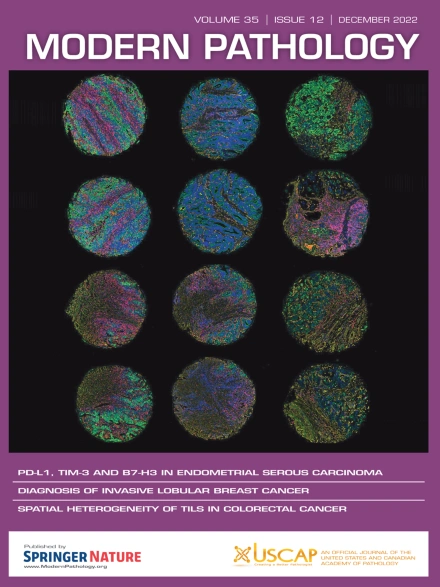空间癌症--免疫表型预测了NSMP分子亚型子宫内膜癌较短的无复发生存期。
IF 7.1
1区 医学
Q1 PATHOLOGY
引用次数: 0
摘要
免疫反应分为三大空间癌症免疫表型(SCI)--炎症型、排斥型和荒漠型--已被认为是预测实体瘤对免疫检查点抑制剂反应的主要指标。本研究的目的是通过将SCI与分子亚型、临床病理特征和预后相关联来定义和描述连续213例子宫内膜癌(EC)的SCI。免疫组化(IHC)和下一代测序(NGS)被用来确定代用的分子亚型:POLE突变型(POLE)、错配修复缺陷型(MMRd)、TP53突变型(p53abn)和无特异性分子特征型(NSMP)。通过全切片 IHC 评估免疫细胞标记物(CD20、CD3、CD8、CD68、PD-L1),并通过数字图像分析进行量化,以确定三种 SCI。心肌细胞被分为四种分子亚型:17个(8.0%)POLE亚型、68个(31.9%)MMRd亚型、42个(19.7%)p53abn亚型和86个(40.4%)NSMP亚型。SCI 测定结果显示,105 例(49.3%)为炎性肿瘤,62 例(29.1%)为荒漠性肿瘤,46 例(25.6%)为排除性肿瘤。与NSMP(45.3%)和p53abn(21.4%)相比,炎症表型在MMRd(64.7%)和POLE(76.5%)亚型中更为普遍。SCI与NSMP肿瘤的DFS密切相关:炎症96.2%,荒漠83.2%,除外40.5%。在接受辅助治疗的NSMP病例中,SCI对预后的影响也保持不变,这导致炎性表型和除外表型之间的复发率存在显著差异。为了简化SCI的判定,研究人员选择了合适的免疫细胞标记物子集来定义三种SCI模式:上皮内CD8高的为炎症表型;CD68、CD20和PD-L1用于区分荒漠型和排除型肿瘤。将 SCI 纳入分子分类可能是改善患者预后风险分层的大好机会,并可指导治疗方法,尤其是在 NSMP 亚型中。因此,不同的免疫反应模式是NSMP亚型的一个新的预后参数。本文章由计算机程序翻译,如有差异,请以英文原文为准。
Spatial Cancer-Immune Phenotypes Predict Shorter Recurrence-Free Survival in the No Specific Molecular Profile Molecular Subtype of Endometrial Carcinoma
Compartmentation of the immune response into 3 main spatial cancer-immune phenotypes (SCIs) – inflamed, excluded, and desert – has been proposed as the main predictor of response to immune checkpoint inhibitors in solid tumors. The objective of the study was to define and characterize the SCI in a consecutive series of 213 endometrial carcinomas (ECs) by correlating it with molecular subtypes, clinicopathologic features, and prognosis. Immunohistochemistry (IHC) and next-generation sequencing were used to assign surrogate molecular EC subtypes: POLE mutant (POLE), mismatch repair deficient (MMRd), TP53 mutant (p53abn), and no specific molecular profile (NSMP). Immune cell markers (CD20, CD3, CD8, CD68, PD-L1) were assessed by IHC on whole sections and quantified by digital image analysis to define the 3 SCIs. ECs were stratified into 4 molecular subtypes: 17 (8.0%) POLE, 68 (31.9%) MMRd, 42 (19.7%) p53abn, and 86 (40.4%) NSMP. SCI determination showed 105 (49.3%) inflamed, 62 (29.1%) desert, and 46 (25.6%) excluded tumors. The inflamed phenotype was more prevalent in MMRd (64.7%) and POLE (76.5%) subtypes compared with NSMP (45.3%) and p53abn (21.4%). SCI revealed a strong correlation with disease-free survival in NSMP tumors: inflamed 96.2%, desert 83.2%, and excluded 40.5%. The SCI prognostic impact was also maintained in NSMP cases treated with adjuvant therapy resulting in a significant difference in recurrence between the inflamed and excluded phenotypes. To simplify SCI determination, a subset of immune cell markers was selected as appropriate to define the 3 SCI patterns: high intraepithelial CD8 for the inflamed phenotype; CD68, CD20, and PD-L1 to discriminate between desert and excluded tumors. The integration of SCI into molecular classification could be a promising opportunity to improve the prognostic risk stratification of patients and may guide the therapeutic approach, particularly in the NSMP subtype. Thus, the different patterns of immune response are a new prognostic parameter in the NSMP subtype.
求助全文
通过发布文献求助,成功后即可免费获取论文全文。
去求助
来源期刊

Modern Pathology
医学-病理学
CiteScore
14.30
自引率
2.70%
发文量
174
审稿时长
18 days
期刊介绍:
Modern Pathology, an international journal under the ownership of The United States & Canadian Academy of Pathology (USCAP), serves as an authoritative platform for publishing top-tier clinical and translational research studies in pathology.
Original manuscripts are the primary focus of Modern Pathology, complemented by impactful editorials, reviews, and practice guidelines covering all facets of precision diagnostics in human pathology. The journal's scope includes advancements in molecular diagnostics and genomic classifications of diseases, breakthroughs in immune-oncology, computational science, applied bioinformatics, and digital pathology.
 求助内容:
求助内容: 应助结果提醒方式:
应助结果提醒方式:


